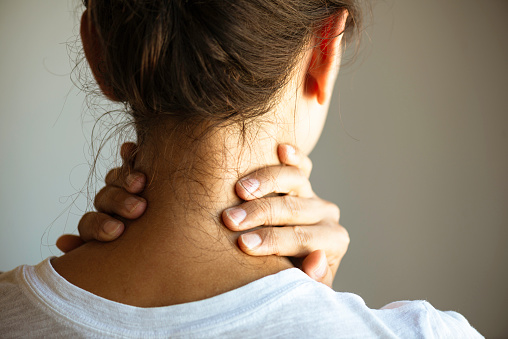
Neck pain is a common problem that can occur for a variety of reasons. In most cases, it can be treated with simple measures like rest, ice, and over-the-counter medication. However, there are times when neck pain requires more aggressive treatment. In this blog post will discuss the causes and symptoms of neck pain, as well as some of the treatments available.
Neck pain can be caused by a number of things, including:
Muscle Strain
The most common cause of neck pain is simply muscle strain. This can be caused by poor posture, repetitive motions, or even sleeping in an awkward position. If you are suffering from neck pain, there are a few things you can do to find relief.
- Over-the-counter pain medication can help to ease the discomfort, and ice or heat therapy may also be beneficial.
- In addition, gentle stretching and massaging the muscles in the neck can also help to relieve pain.
If your neck pain is severe or does not improve with home treatment, it is important to see a Physiotherapy Mill Park to rule out any other potential causes.
Arthritis
One possible cause of neck pain is arthritis, which is a degenerative condition that affects the joints. There are two main types of arthritis that can affect the neck: osteoarthritis and rheumatoid arthritis.
- Osteoarthritis is a type of arthritis that occurs when the cartilage in the joints breaks down, causing the bones to rub together. This can lead to inflammation, pain, and stiffness in the joints.
- Rheumatoid arthritis is a type of arthritis that occurs when the body’s immune system attacks the joints, causing inflammation. This can also lead to pain and stiffness in the joints. If you are experiencing neck pain, it is important to see a local physiotherapists in Epping and Doreen so that they can determine the cause and provide treatment. Neck pain can be treated with medication, physical therapy, or surgery.
Herniated Disc
A herniated disc occurs when the jelly-like center of a disc breaks through the outer casing and puts pressure on the nerves nearby. This can cause pain, numbness, and weakness in the arms or legs. In some cases, it may also lead to headaches or dizziness. While herniated discs are most often diagnosed in people over the age of 40, they can occur at any age. Treatment for a herniated disc may include physical therapy, pain medication, or surgery. Depending on the severity of the condition, some people may only need to make lifestyle changes, such as using proper posture and getting regular exercise.
Symptoms of neck pain include:
- Stiffness
- soreness
- Difficulty moving the head
- Started sensation
- Muscle spasms
- Headaches
- Tenderness
Treatment for neck pain depends on the cause. For example, if the pain is due to muscle strain, over-the-counter medication and rest may be all that is needed. If the pain is due to arthritis or a herniated disc, however, more aggressive treatment may be necessary.
If you are experiencing neck pain, it is important to see your Epping physiotherapy or clinical pilates Epping to rule out any serious underlying conditions. Once a diagnosis has been made, your doctor will work with you to develop a treatment plan that is best for you.
In some cases, neck pain can be resolved with simple measures like rest, ice, and over-the-counter medication. However, there are times when neck pain requires more aggressive treatment. If you are concerned about your neck pain, be sure to talk to your doctor to find out what options are available to you.




